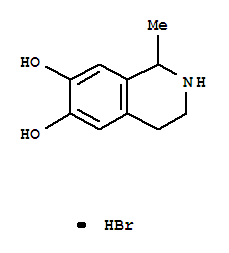| Identification |
| Name: | 6,7-Isoquinolinediol,1,2,3,4-tetrahydro-1-methyl-, hydrobromide (1:1) |
| Synonyms: | 6,7-Isoquinolinediol,1,2,3,4-tetrahydro-1-methyl-, hydrobromide (7CI,9CI) |
| CAS: | 59709-57-8 |
| Molecular Formula: | C10H13 N O2 . Br H |
| Molecular Weight: | 260.13 |
| InChI: | InChI=1/C10H13NO2/c1-6-8-5-10(13)9(12)4-7(8)2-3-11-6/h4-6,11-13H,2-3H2,1H3/p+1/t6-/m1/s1 |
| Molecular Structure: |
 |
| Properties |
| Melting Point: | 186-187 °C(lit.)
|
| Flash Point: | 175.4°C |
| Boiling Point: | 362.6°C at 760 mmHg |
| Specification: |
Off-White Powder
usageEng:Salsolinol is derived from the neurotransmitter dopamine and acetaldehyde. Interest in this molecule comes from studies suggesting that it might be involved in alcohol addiction, as acetaldehyde is both a well recognized substrate for the Pictet-Spengler reaction and the primary metabolite of ethanol in the liver. It has further been suggested that acetaldehyde formed as a result of alcohol consumption might induce central changes in the metabolism of dopamine.
Safety Statements:26-36
26:In case of contact with eyes, rinse immediately with plenty
of water and seek medical advice
36:Wear suitable protective clothing |
| Flash Point: | 175.4°C |
| Storage Temperature: | Hygroscopic, -20?C Freezer, Under Inert Atmosphere |
| Usage: | Salsolinol is derived from the neurotransmitter dopamine and acetaldehyde. Interest in this molecule comes from studies suggesting that it might be involved in alcohol addiction, as acetaldehyde is both a well recognized substrate for the Pictet-Sp |
| Safety Data |
| |
 |